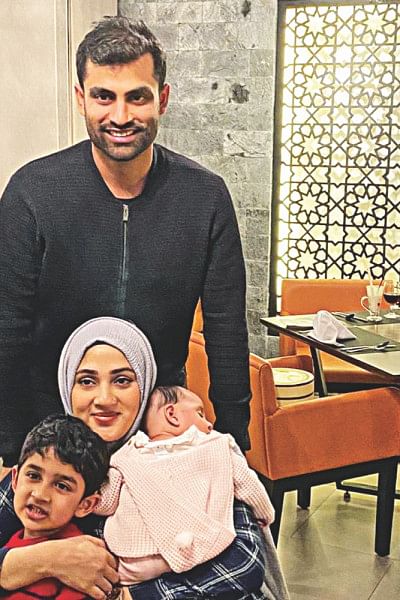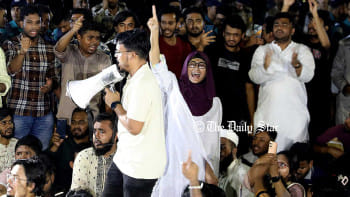We should have our own mantra to be successful: Tamim

The Daily Star (TDS): Spending time at home during coronavirus outbreak?
Tamim Iqbal (TI): Truth be told, I am not facing any big issues. I am not getting annoyed, bored or anything else. Normally I do my running in the morning and after that I spend time with the kids. Maybe I'll watch a movie and time passes.
If you think about it from the perspective that first you are doing it for yourself as well as the safety of others, life becomes easier.
There is nothing bigger than life and to that end, if I have to spend time at home for one or two months, I should not be upset. I am not thinking about cricket at the moment given the situation that's prevailing. We can see how the situation is in various parts of the world. By Almighty's blessing the situation in Bangladesh is still okay, but if we face something like that, it will be a big disaster. Most important thing is to follow the directives that are coming to us and when it passes, we will have enough time to prepare for our professional life.
TDS: How difficult is it to bat for a side which has seen quite a few batting collapses when top-order doesn't click?
TI: It used to happen regularly four or five years ago, but compared to those times, it's happening lesser now. It was challenging at those times; somebody had to do something differently to stop that. I feel I started playing differently around that time so that we don't lose a flurry of wickets. Before 2015, you would notice that we used to lose two or three more wickets right after a wicket fell.
TDS: Tell us about your anchor role and how much do you enjoy it?
TI: I don't really see it as an anchor role. On days that I get out early, if another one from top three or four stays till the 35th over, it's an added advantage for the side. The thing about the anchor role is, when a set batsman is at the crease, it doesn't matter whether his strike rate is 120 or in the 75-to-80 percentage range. The thing is, with that player at the crease, you can play around him as a team. Afte all, it is a team sport.
If Bangladesh reach 160 to 170 in 30 overs but lose six wickets, you have very little chance of winning the match even though your run rate is close to six. But if you reach 140-145 in 30 overs for only two wickets, you have a very good chance of scoring 280-300 and your chances of winning the match improve. The beauty of ODI cricket is that you will start in one way, build another way in the middle and finish it a different way.
Whether I like my role or not, what's more important is that someone is staying at the crease. It can be me or Liton Das or someone who bats at number three. Our team's objective is that someone bats till the 40th over.
There are some innings which people won't appreciate. Even in our team, I see it happens a lot with (Mahmudullah) Riyad bhai. Sometimes one might check stats and say that he hasn't scored a ton in three years, for example. But the 30- or 35-run knocks that he plays, while batting at number six, don't get appreciated. Sometimes those 30 runs are as good as 60 or 70 runs, but normally people only appreciate 100s or five-wicket hauls. If you think about it, if someone scores a hundred, the rest still need to score 200 for a good total.
Man-of-the-series in the 2019 World Cup was Kane Williamson and he scored his runs at a 70-odd run-rate because even for that run-rate, the runs he scored were very valuable.
TDS: You took a break after the Sri Lanka series and came back to hit form. Was the break helpful in exploring ways to improve?
TI: What I realise now is that I should have taken a break for the Sri Lanka tour. I didn't do well at the World Cup and I was so desperate to score runs that I started training two days after I returned from that long tournament. I overtried and failed again in the Sri Lanka tour. I needed a break to mentally refresh myself.
During the break I didn't even touch the bat or ball. I decided that I will do things I don't like so I can become stronger mentally. I like to do running for fitness but I don't enjoy the gym. So I started doing gym. I went to Bangkok and hired a trainer and stayed there for 40 days and trained six days a week, two sessions each day, 12 in a week.
TDS: How difficult is it to take over from someone like Mashrafe Bin Mortaza as ODI captain?
TI: (Laughs) It would have been a big challenge not just for me but anyone since you are comparing to the most successful captain in Bangladesh's history. But if I concentrate on it and start comparing then I will not do justice to the team because those are very heavy shoes to fill. But Mashrafe Bin Mortaza did not become what he is in a year. He needed four or five years. To get to his level, I would need a lot of time. I would try my best and if I feel someone else is a better fit after a certain time, I would step down.
TDS: Do you have a vision for the team culture? What does that entail?
TI: I will take a great dressing room environment and players enjoying each other's success, but not getting results over one dressing room environment that doesn't have those but are enjoying success. With a good culture, I know in time we will get better results but with the latter, the results will eventually stop.
TDS: As possibly the cricketer closest to Mashrafe with lots of adda sessions with him, what are the cultural aspects you want to take from Mashrafe? What are the leadership cues that you picked up?
TI: The biggest lesson I have learnt from Mashrafe bhai is that you can sometimes win the match the night before. If you have the right attitude and know what you have to do, you will have an extra edge. This is what I have learnt from him regarding how to keep everyone happy and positive. It happened in West Indies; we had a poor Test series and when he joined, the whole team's mood transformed in 24 hours.
TDS: What is the significance of the addas with seniors and juniors?
TI: In a team meeting, the environment is serious and intense. During an adda, maybe even at a tea stall, one can open up and say what's in his mind. You have to understand that we Bangladeshis are shy people and maybe we won't say something in front of 20 people but we might be able to do that in front of two people. That's how [through understanding and discussion] a team is built. We have different culture; we think differently and we should have our own mantra to be successful instead of following other teams. In 15 years, I want people to say that 'this is how the Bangladesh team thinks' or 'this is how a Bangladeshi thinks'. Like people do for Australia or current India side, I want people to see Bangladesh like that for our own way of doing things. We need to invest time on how we want to play our cricket.
TDS: During away tours, you are the person who makes most eating-out arrangements and makes sure the team has exposure to local culture, right?
TI: A young player may find himself at sea going to a restaurant in an away tour. Education comes in many forms. If that player can go and order food and know the scenario, he will feel good about himself. It's not going to make them better cricketers but they will get some self-confidence and they can adjust themselves better and go out on their own later. I like to try new cuisines and love grabbing a few people and going out to eat so I just do that normally.

 For all latest news, follow The Daily Star's Google News channel.
For all latest news, follow The Daily Star's Google News channel. 



Comments